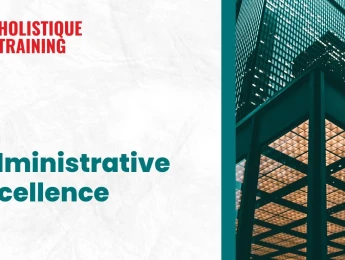Office administration and corporate governance practices play integral roles in shaping organisations' operational framework and ethical standards.
Traditionally, office administration focused on streamlining day-to-day tasks, ensuring efficient workflows, and maintaining a conducive work environment. Simultaneously, corporate governance established decision-making, risk management, and accountability guidelines. However, the evolving business climate, marked by technological advancements, globalisation, and societal shifts, has transformed these practices.
Today, office administration extends beyond physical spaces, incorporating digital tools for remote collaboration and flexible work arrangements. Corporate governance, likewise, faces new challenges in aligning diverse stakeholder interests and meeting heightened expectations for transparency and social responsibility.
Adapting to these changes requires a dynamic approach, integrating technology into administration processes, revisiting governance structures, and fostering a corporate culture that values innovation, inclusivity, and ethical business practices.
Upon completion of this course, participants will be able to:
- Understand the foundational principles and primary duties involved in office administration.
- Differentiate between office administration and management, recognising its pivotal role in promoting efficiency and professionalism.
- Foster interpersonal skills to excel in relationship management, coaching, and networking for effective collaboration.
- Enhance workplace interactions by refining communication abilities, including writing skills.
- Acquire expertise in time management, multitasking, and goal-setting to boost productivity.
- Explore tools and technologies aimed at streamlining office organisation and optimising records management.
- Navigate adeptly through workplace etiquette, conflict resolution, and assertiveness, ensuring smooth interactions.
- Develop proficiency in customer relationship management, particularly in handling sensitive situations.
- Master the art of financial administration and event management for comprehensive skill development.
- Strengthen competencies in emotional intelligence, conflict resolution, and communication within corporate governance.
This course is designed for anyone responsible for administration within a large organisation or office environment or who manages an administration team. It would be most beneficial for:
- Office Administrators
- Admin Managers
- Senior Admin Managers
- Business Owners
- Directors
- HR Professionals
- Project Managers
- Team Leaders
- Bid Writers
- Customer Service Representatives
- Operations Managers
This course uses a variety of adult learning styles to aid full understanding and comprehension. Participants will experience trainer-led presentations to understand the developing world of administration and the changes that remote working and global growth companies have made to their job roles.
They will also review various document management systems, organisational tools, and communication styles through real case studies and role-playing activities to develop a full understanding of their own roles within their organisation.
Day 5 of each course is reserved for a Q&A session, which may occur off-site. For 10-day courses, this also applies to day 10
Section 1: Office Admin: What’s Required?
- Understanding the basics of administration.
- Effective time management for administrative tasks.
- Organising and prioritising workload.
- Developing efficient filing and documentation systems.
- Communication skills for administrative professionals.
- Using technology and software for task management.
- Handling email correspondence and communication etiquette.
- Streamlining meetings and appointments.
- Delegation and teamwork: Covey Matrix.
- Stress management and coping strategies for administrators.
- Staying organised in a fast-paced administrative environment.
- Handling confidential information and data security.
Section 2: How to Effectively Manage Tasks
- Principles of effective task prioritisation.
- Time management techniques for improved productivity.
- Goal setting and task alignment strategies.
- Project management methodologies and their application.
- Agile and flexible task management approaches.
- Using technology for efficient task tracking.
- Collaboration tools and their role in task management.
- Adapting task management strategies to diverse work environments.
- Stress-free task execution and time-sensitive decision-making.
- Continuous improvement and feedback in task management systems.
- Integrating task management into personal and professional life.
Section 3: Conflict Management & Professionalism
- Identifying and addressing conflict triggers.
- Strategies for de-escalation and maintaining professionalism.
- Negotiation techniques for resolving conflicts.
- Fostering a positive and collaborative work environment.
- Conflict management in diverse and multicultural teams.
- Handling difficult conversations with professionalism.
- Assertiveness and active listening in conflict resolution.
- Ethical considerations in conflict management.
- Building strong interpersonal relationships to prevent conflicts.
- Role-playing and simulation exercises for practical conflict resolution.
- Addressing power imbalances and promoting fairness.
Section 4: Stakeholder Communication & Relationship Building
- Tailoring messages to diverse stakeholder groups.
- Building and maintaining positive stakeholder relationships.
- Using technology in stakeholder communication.
- Managing expectations through transparent communication.
- Conflict resolution and problem-solving with stakeholders.
- Incorporating feedback in stakeholder interactions.
- Cultural sensitivity in cross-cultural stakeholder relationships.
- Crisis communication and reputation management.
- Stakeholder engagement in decision-making processes.
Section 5: Technological Considerations of a Changing Environment
- Cloud-based solutions for administrative tasks.
- Cybersecurity awareness and best practices.
- Integrating automation for increased efficiency.
- Leveraging artificial intelligence in administrative processes.
- Data management and privacy considerations.
- Mobile technology and remote administrative work.
- Optimising workflow with project management tools.
- Digital communication platforms and collaboration tools.
- Electronic document management and e-signatures.
- Training on new software and technology adoption.
- Addressing challenges and risks in the evolving tech landscape.
- Staying updated on technological advancements in administration.
Upon successful completion of this training course, delegates will be awarded a Holistique Training Certificate of Completion. For those who attend and complete the online training course, a Holistique Training e-Certificate will be provided.
Holistique Training Certificates are accredited by the British Assessment Council (BAC) and The CPD Certification Service (CPD), and are certified under ISO 9001, ISO 21001, and ISO 29993 standards.
CPD credits for this course are granted by our Certificates and will be reflected on the Holistique Training Certificate of Completion. In accordance with the standards of The CPD Certification Service, one CPD credit is awarded per hour of course attendance. A maximum of 50 CPD credits can be claimed for any single course we currently offer.
- Course Code MG1-116
- Course Format Classroom, Online,
- Duration 5 days














